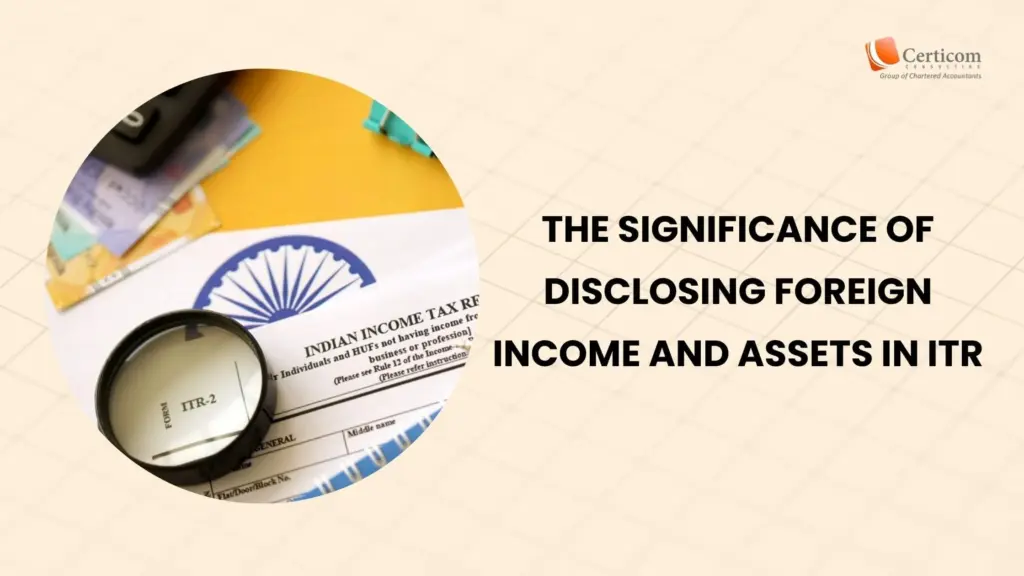The Significance of Disclosing Foreign Income and Assets in ITR

In today’s globalized economy, individuals increasingly earn income and hold assets beyond their home countries. With this rise in cross-border investments, expenditures, and incomes, accurately disclosing foreign income and assets in Income Tax Returns (ITR) has become a vital compliance requirement for taxpayers. Non-compliance can lead to severe penalties, legal actions, and reputational risks.
Residential Status and Tax Liability
A taxpayer’s residential status determines their global tax liabilities. Residents of India are required to disclose foreign income and assets as per the Income Tax Act, 1961. Schedules like Schedule FA (Foreign Assets) and Schedule FSI (Foreign Source Income) are integral to reporting such details. Additionally, taxpayers can avail tax credits on taxes paid in other jurisdictions by filing Schedule TR (Tax Relief), leveraging treaties signed between countries.

Digital Transformation and Enhanced Tax Scrutiny
Advancements in digital systems and data-sharing frameworks have significantly enhanced tax authorities’ ability to track global financial activities. International initiatives like the Common Reporting Standard (CRS) by the Organisation for Economic Co-operation and Development (OECD) and the Foreign Account Tax Compliance Act (FATCA) by the United States facilitate the automatic exchange of financial information across borders. These frameworks mandate financial institutions to report details of foreign account holders, ensuring greater transparency.
As a result, income tax departments worldwide, including in India, have access to extensive data on foreign income and assets. Taxpayers are therefore urged to ensure full disclosure to avoid scrutiny.
Legal Consequences of Non-Compliance
The failure to disclose foreign assets and income can attract stringent penalties under the Black Money (Undisclosed Foreign Income and Assets) and Imposition of Tax Act, 2015. The penalties not only include fines but can also lead to prosecution.
For instance, the omission of foreign assets or income in the ITR can result in:
- Monetary penalties.
- Interest on undisclosed tax liabilities.
- Criminal prosecution in severe cases of evasion.
Opportunity to Rectify Errors: Revised Returns
If you have inadvertently omitted foreign income or assets in your original ITR, there is still an opportunity to make corrections. The Income Tax Department allows taxpayers to rectify omissions or inaccuracies by filing a revised return. For the Assessment Year 2024-25, taxpayers can file revised returns until December 31, 2024.

Why Timely Disclosure Matters
- Compliance: Ensures adherence to tax laws and avoids penalties.
- Transparency: Establishes credibility with tax authorities and mitigates audit risks.
- Tax Relief: Enables taxpayers to claim legitimate tax credits under international treaties.
Key Takeaways
- Always determine your residential status to understand your tax liabilities.
- Use the appropriate schedules in the ITR to report foreign income and assets.
- Claim tax credits for taxes paid abroad through Schedule TR.
- Stay vigilant about the deadlines for revised returns.
Disclosing foreign income and assets is not just a regulatory requirement; it’s a step towards ethical and transparent financial management. Ensure compliance to avoid penalties and contribute to the broader objective of global tax transparency.
Related Post
Foreign Tax Credit in India: A Guide for NRIs
Top 10 Tax Filing Rules for FY 2024-25
Book A One To One Consultation Now For FREE
How can we help? *




